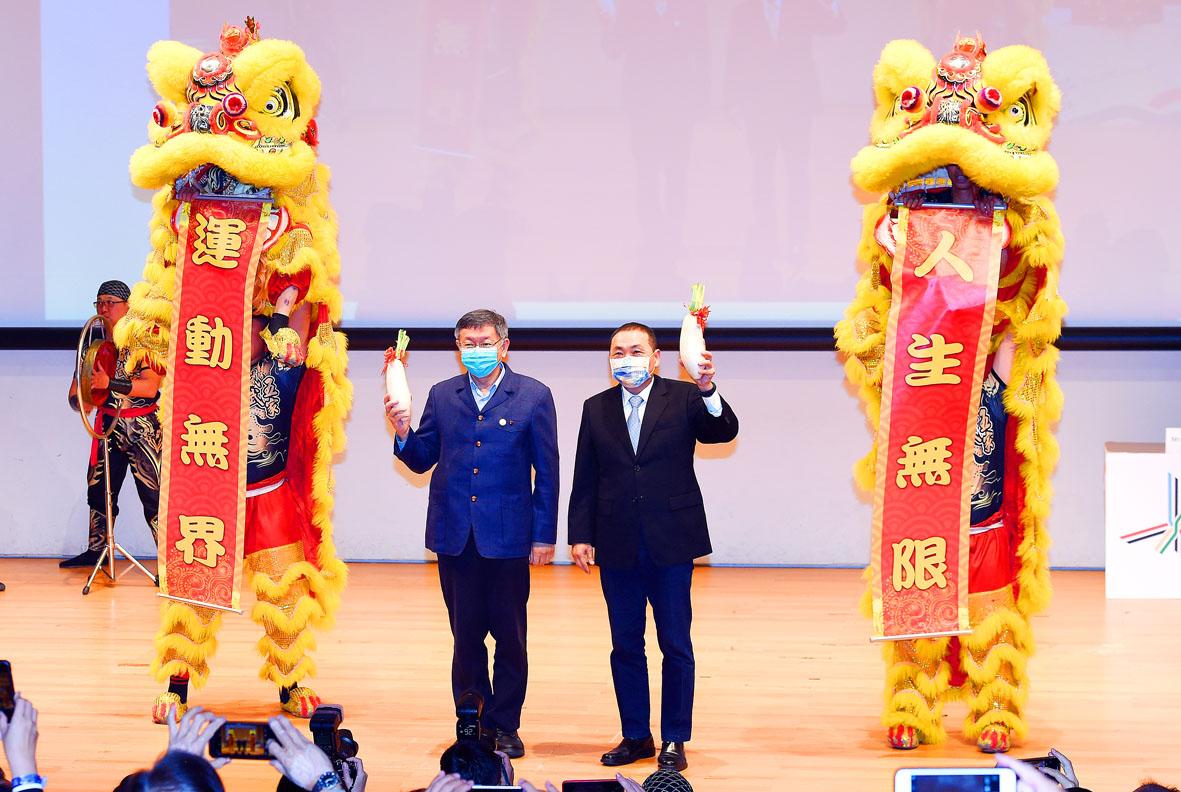The mayors of Taipei and New Taipei City on Thursday signed a contract to host the 2025 World Masters Games, an international sporting competition for athletes aged 30 or older.
Taipei Mayor Ko Wen-je (柯文哲) and New Taipei City Mayor Hou You-yi (侯友宜) formalized the agreement in a video call with Kai Holm and Jens Holm, president and chief executive officer respectively of the International Masters Games Association, which organizes the event.
The Games, which are held every four years, involve a wide range of sports, with athletes competing as individuals rather than in national teams.

Photo: CNA
Taipei and New Taipei City were confirmed as the hosts in October, edging out Paris and the Australian city of Perth to host the Games’ 2025 edition, which is scheduled for May 17 to May 30.
In a pre-recorded video message played at the contract signing, President Tsai Ing-wen (蔡英文) said that Taiwan aims to host the most successful edition of the Games ever and would do its utmost to realize the ideal of “Sports for All.”
The nation would build on its experience hosting international sporting competitions, including the 2009 Deaflympics in Taipei, the 2009 World Games in Kaohsiung and the 2017 Taipei Summer Universiade, Tsai said, adding that the entire country would support the host cities.
When Taipei and New Taipei City announced the hosting rights, Taipei Deputy Mayor Tsai Ping-kun (蔡炳坤) said that about 48,000 athletes and their families from 110 countries are expected to visit Taiwan for the Games, which features 32 sports.
It is estimated that the Games will cost about NT$1.6 billion (US$56.3 million), he said at the time.
The Games are expected to bring in NT$10 billion in tourism revenue, said Li Tzai-li (李再立), head of the Taipei Sports Department.
The World Masters Games, launched in 1985 in Toronto, are usually held the year after the Olympics.
The previous edition was in Auckland, New Zealand, in 2017, while the next is to be hosted in Japan’s Kansai region in 2022, one year after originally scheduled due to the COVID-19 pandemic.

Three Taiwanese airlines have prohibited passengers from packing Bluetooth earbuds and their charger cases in checked luggage. EVA Air and Uni Air said that Bluetooth earbuds and charger cases are categorized as portable electronic devices, which should be switched off if they are placed in checked luggage based on international aviation safety regulations. They must not be in standby or sleep mode. However, as charging would continue when earbuds are placed in the charger cases, which would contravene international aviation regulations, their cases must be carried as hand luggage, they said. Tigerair Taiwan said that earbud charger cases are equipped

Foreign travelers entering Taiwan on a short layover via Taiwan Taoyuan International Airport are receiving NT$600 gift vouchers from yesterday, the Tourism Administration said, adding that it hopes the incentive would boost tourism consumption at the airport. The program, which allows travelers holding non-Taiwan passports who enter the country during a layover of up to 24 hours to claim a voucher, aims to promote attractions at the airport, the agency said in a statement on Friday. To participate, travelers must sign up on the campaign Web site, the agency said. They can then present their passport and boarding pass for their connecting international

UNILATERAL MOVES: Officials have raised concerns that Beijing could try to exert economic control over Kinmen in a key development plan next year The Civil Aviation Administration (CAA) yesterday said that China has so far failed to provide any information about a new airport expected to open next year that is less than 10km from a Taiwanese airport, raising flight safety concerns. Xiamen Xiangan International Airport is only about 3km at its closest point from the islands in Kinmen County — the scene of on-off fighting during the Cold War — and construction work can be seen and heard clearly from the Taiwan side. In a written statement sent to Reuters, the CAA said that airports close to each other need detailed advanced

The age requirement for commercial pilots and airline transport pilots is to be lowered by two years, to 18 and 21 years respectively, to expand the pool of pilots in accordance with international standards, the Ministry of Transportation and Communications announced today. The changes are part of amendments to articles 93, 119 and 121 of the Regulations Governing Licenses and Ratings for Airmen (航空人員檢定給證管理規則). The amendments take into account age requirements for aviation personnel certification in the Convention on International Civil Aviation and EU’s aviation safety regulations, as well as the practical needs of managing aviation personnel licensing, the ministry said. The ministry